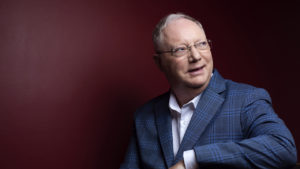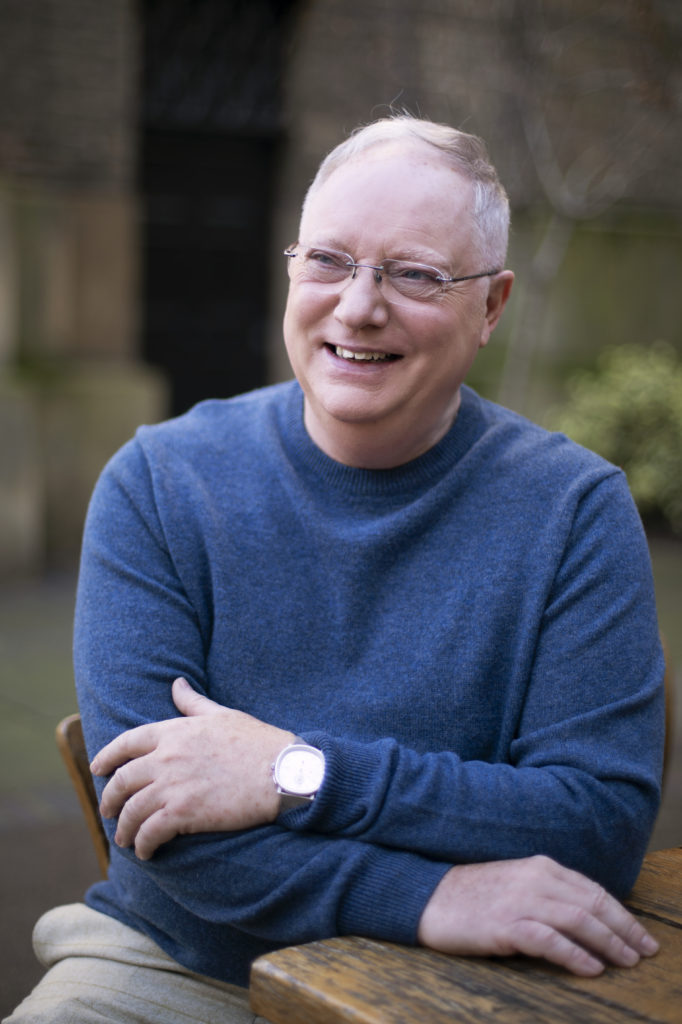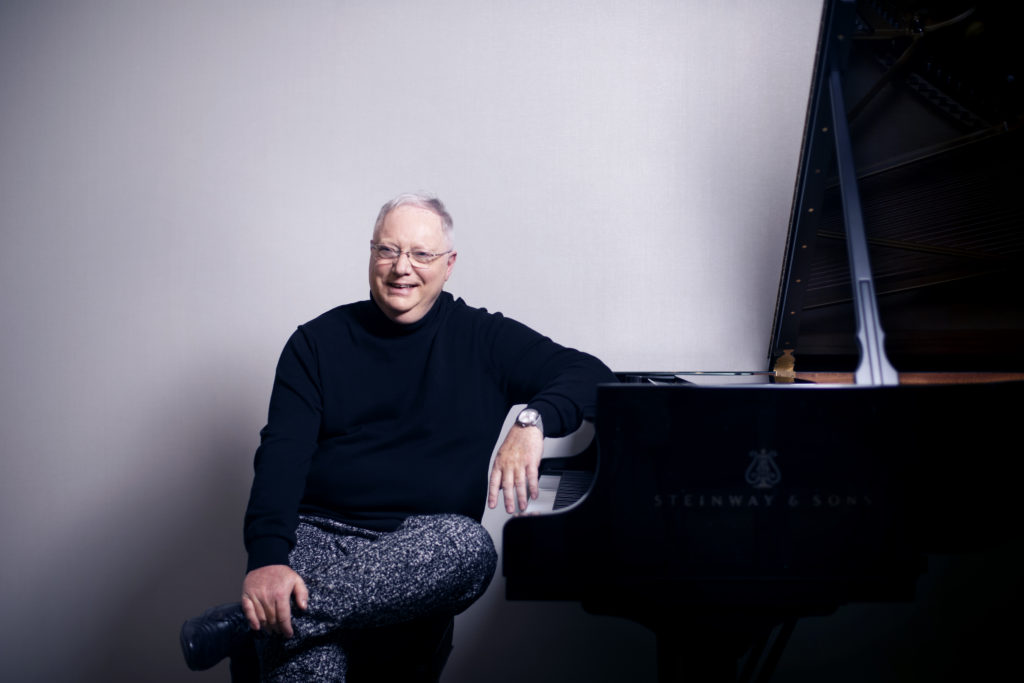
At Home With – Vocal Coach Paul Farrington in Birmingham, UK
By Chris RuelPhotos: Frances Marshall
“At Home With… ” is a collaboration between OperaWire and photographer Frances Marshall of Marshall Light Studio, combining original photography with insightful interviews that reveal the human side of artists.
Call him the “Voice Whisperer.” It seems vocal coach par excellence Paul Farrington can teach most anyone to sing, including the cast of Dustin Hoffman’s 2013 film, “Quartet.” For Hoffman’s movie, Farrington coached Maggie Smith, Tom Courtenay, Billy Connolly, and Pauline Collins to take on the quartet from “Rigoletto.” According to Farrington, they sang it beautifully, so much so it hit the cutting-room floor because the production company didn’t think audiences would believe the actors actually performed the quartet.
If you’re a fan of the Netflix series, “Bridgerton,” you know it includes some opera. Who’s the voice coach? Paul Farrington. He has also served as music consultant and coach for the Oscar-nominated film, “The Theory of Everything,” and as the opera consultant for Series Four of “The Crown.” The coach just finished working on “A Town Called Malice” for Sky Movies.
As a classically trained tenor, Farrington, who works as a vocal consultant at the Royal Opera House, can stealthily swoop in to assist artists needing immediate help. These are Better Call Paul moments, and nothing brings him more satisfaction than to see the artist he assisted make it through the problematic section. Farrington serves in the same capacity at Göteborgs Operan in Sweden and Charles Wood Summer School in Northern Ireland.
During the height of the pandemic, Farrington consulted with a sound engineer he knew from “Bridgerton,” and in short order, the vocal coach was set up with a professional kit that facilitated high-quality online teaching from home. Before online teaching technology improved, Farrington said he “hated it and vowed never to do it again;” he now embraces the practice, however, and teaches students around the world.
Though no longer associated with the Estill Voice Training™ model, for which he taught classes in London and abroad for 35 years, Farrington focuses on the entire body and isolating certain structures within the vocal mechanism for sound production, incorporating such practices as Pilates into his coaching.
Currently, Farrington is preparing the Paul Farrington Voiceworks Third Summer Programme 2022. Farrington will hold two classes in London. The first is a singing masterclass, slated for July 13-15, 2022. The second is a professional voice users’ course, scheduled for July 18-19.
In this installment of “At Home With,” OperaWire talked with Farrington, who grew up and lives in Birmingham, UK, about his hectic weekly schedule; greatest achievement; who among the past opera stars he would have loved to coach; and if there’s such a thing as the perfect voice.
OW: Tell me about a typical week in the life of Paul Farrington
PF: I was fortunate enough to set up a studio here. [When the pandemic hit,] I contacted a colleague of mine who was a sound engineer I work closely with on “Bridgerton” and said, “Hey, I think I need to set myself up with the best kit possible.” He advised me to get what I needed. Thank God because I worked through the pandemic. I picked up students from all over the world.
On a Monday morning, I talk with the students in New Zealand, and then I go to Australia, and then I work my way around Europe, finishing the afternoon in Los Angeles. So, that’s my week when I’m in the UK. And then when I’m working in the various opera houses, those are six-hour coaching days, Monday to Friday. Then I get on a plane like a zombie to come home on a Friday evening.
OW: How do you maintain a healthy work-life balance?
PF: I’m fortunate enough to pick what I do. When I’m away working in the various opera houses, they are very heavy weeks. I can do them, provided I know I have the space on either side to build up my energy level because I want to give the last student on a Friday afternoon the same energy that I gave on a Monday morning. I wouldn’t forgive myself if I didn’t.
But that has a cost–an emotional and psychological cost. You must take time when you’re giving out all that. You must find the time. I live alone here in Birmingham. I have a beautiful home surrounded by fabulous gardens. It’s very relaxing here, and I’m not involved in the music scene in Birmingham at all so I can hide. That’s how I recharge.
OW: You enjoy Pilates and yoga. Do you incorporate these practices when coaching?
PF: Absolutely. As I always say to singers, you’re going to have to die in many different positions. And not all of them are going to be optimal. I think ‘support’ is widely misunderstood both by students and very often by teachers. It becomes a panacea to fix any problem. Something’s not working in the voice? You need to support more.
So, the student grabs whatever they think to support more. And, of course, that doesn’t fix the problem because that wasn’t the problem in the first place. The teacher says no, you’re not supporting enough. And the whole thing becomes a sort of self-fulfilling prophecy and ends up in tension.
Pilates taught me to isolate certain muscle groups within the body to recruit whatever we need, given that singing is a dynamic system. It can’t be one size fits all; that’s my belief, and this is what I teach. Students seem to find it works for them.

OW: What has been one of your favorite projects?
PF: The project that I look back on with the most pleasure was the movie “Quartet.” And that came about because I had a friend who was the second assistant director for the film. She said quite some months before that this project was coming up. If it happened, she wanted to be in touch with me. I heard nothing. Months and months went by, and I had been away working in Rome.
I returned exhausted, sat down on the sofa with a gin and tonic in my hand, and the phone went. And it was my friend Olivia calling to say, “You know that project we talked about? Well, it’s happening. Are you interested?” And I said, “Yes, of course, I’m interested.” She said, “Great. You need to be in London tomorrow morning to meet with Dustin Hoffman. And I said, “Olivia, I’m exhausted. I’ve just come back from this job in Rome, and I’m shattered.”
She said, “Look, it’s Maggie Smith, it’s Tom Courtenay, it’s Pauline Collins….” (Billy Connolly came on later because an actor had to pull out because of illness.) And once I heard those names, how could I say no?
I was on the train to London the following day with all the businesspeople and having my breakfast when suddenly the phone rang. It was Dustin Hoffman’s assistant, Amanda, and she told me, “Dustin’s here. Are you happy to talk to him? He wants to talk to you before you arrive at the meeting this morning.”
Once there, Dustin said, “How are we going to do this?” I replied, “Well, they’ve got to sing to whatever level they can. They can’t just stand there and open and close their mouths. If you want this to be authentic, they must sing this.
They actually sang the quartet from “Rigoletto.” And the notes that Maggie couldn’t sing as Gilda, we transposed down. Both Tom Courtenay and Pauline Collins have beautiful voices, and were able to sing beautifully.
On a Saturday before we were due to film the following Tuesday, Dustin came out to my studio. All four of them came. Dustin sat behind me with his assistant, and they sang through the quartet.
I could see them responding, and I thought, God bless them, they’re really going for it. When we finished, I turned around, and Dustin was in tears and said, “You’ve given me the end of my movie they told me I couldn’t have.” But of course, they did not use it in the film because Harvey Weinstein felt that nobody would believe it was them.
OW: Were they shocked they could sing opera?
PF: The first day that Maggie came, I was terrified of working with this mammoth character of the theater. I was in my apartment, and the doorbell rang. It was Maggie.
I said, “Shall I come down for you?” “No, darling. I’ll find my own way up.” I was looking through the spy hole, and I could see her coming along this very long corridor, and all I could see were all those characters that I had known her for over all the years.
When I opened the door, she said, “I don’t know why I’m here. I can’t f*****g sing.” I said, “Who told you that?” She replied, “When I was at school, they always told me just to mouth, not make a noise.”
I took her to the piano, and I played a note, and she sang it back to me. I played another note. She sang it, and then I played a little melody. She sang it back to me pitch-perfect. And I said, “Maggie, you can sing.” These little tears started. After that, she trusted me, and we got on brilliantly, as did the others. They were just wonderful together. And their joy! Maggie rolled back on my sofa with her legs and hands in the air, giggling like a little girl. She couldn’t believe what we had done.

OW: How do you build trust?
PF: I suppose it depends where you start from. I mean, they trust, I suppose, that any coach that they would go to for anything–whether it be a dialogue, an accent coach, or whatever–I imagine they trust that the producers are sending them to that particular coach because they have a certain skillset that will ensure that they get the help they need to do their job. I was lucky that the four of them were so open to anything.
They were nervous, all of them terrified, absolutely terrified. As soon as they started to make the sound and experience it, it was like a drug; that’s why singers do it. There is nothing quite like that sensation of that sound vibrating through your whole body.
OW: Is there such a thing as a perfect voice?
PF: Well, I suppose it’s all subjective. Some very famous voices leave me cold and don’t ring my bell. I believe we all vibrate. I think certain voices vibrate a sympathetic resonance to us or produce sounds that resonate within us in a certain way. Those are the voices that touch and move us, and sometimes they’re not the most beautiful voices. I can think of two or three very beautiful famous voices, but I am unmoved no matter what they do. Other voices aren’t technically as perfect, but there is some quality in that sound that touches me deeply.
[I can think of] three voices [that] are the height of perfection. One is the first classical recital I was ever taken to at 14 years old, and that was Dame Janet Baker. The second is Arleen Auger and then Lisette Oropesa. It’s such a joy when I go to performances where the singer is just so phenomenal that my antenna doesn’t twitch once, but those evenings are very far and few between, but oh my God, when they happen! The last one was just a couple of months ago, with Lisette singing “Traviata” at Covent Garden. I have experienced nothing so beautiful and exquisite in all my life, in every respect.
OW: What do you consider your most outstanding achievement?
PF: I have so many students singing on the great opera stages and concert halls of the world.
Sometimes I have to fix things on short notice. I have to go in and quickly diagnose what’s going on and then give them some things. If I’m called in on an emergency basis, I may not know the singer and have never worked with them before. It’s a very stressful situation for both the singer and myself because I’ve got to try to fix the problem the best way I can. They are trusting someone that they don’t know. When I give them something, I say, “If you do this, if you do that, you will get you through.”
Then, when I’m sitting in the performance, and I hear them do what I’ve asked of them, and it gets them through that moment where they were having problems, that’s winning.
OW: If you could have worked with any of the greats, who would it be?
PF: Oh, that’s a big one. I think probably Maria Callas because her voice is so fascinating. She didn’t always make the most beautiful sounds, but even the ugly ones, she meant them. I would love to have heard her sing in real life. It must have been spectacular.
OW: I like what you said about “meaning it,” even when a singer isn’t at their best.
PF: Let’s face it. The number of nights during any professional singer’s career when they’re going to feel 100 percent could probably be counted on both hands. They could be functioning at 60 percent, 70 percent, 80 percent, or 90 percent the rest of the time. It’s knowing that they have the technique to deliver what they need to deliver even when it’s a 50 percent or 60 percent night.
OW: What’s the best piece of advice you’ve been given?
PF: One of my best friends, an American voice coach who was the head of the Physics Department at the University of Central Florida, in Orlando, said to me at one point when I was trying to decide whether to leave a particular job which was very safe in order to go freelance. He told me to take a leap of faith, and I did. That has made a huge difference.



